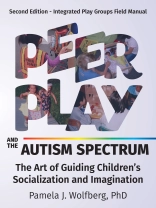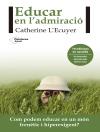Support autistic children in shared play with peers using this evidence-based curriculum!
Countless children on the autism spectrum spend too much time alone. Without the necessary guidance, they are especially vulnerable to being excluded from their peer group and leading impoverished play lives. First published 20 years ago, this practical guide offers an introduction to the basic principles, tools, and techniques that make up the Integrated Play Groups.® (IPG) model.
Pamela Wolfberg has translated theory into effective and meaningful practice, giving practitioners, parents, and other caregivers the knowledge and skill to start inclusive peer play groups for children at school, home, and in community settings. The second edition has new research and is heavily influenced by the neurodiversity movement. And while aspects of the IPG model have been updated from earlier versions of this work, the original principles and practices are still the same.
It is inspired from deep engagement with people who identify as autistic or neurodivergent, including professionals, scholars, students, advocates, friends, and family members.
Mục lục
CHAPTER 1: Introduction
MODULE I: Embracing the Spirit of Play – IPG Conceptual Foundation
CHAPTER 2: Insights into Peer Play and Autism
CHAPTER 3: Nature of Play in Autism
CHAPTER 4: Making Peer Play a Priority
TOOLS AND FIELD EXERCISES
Self-Reflection Log
IPG Fidelity Check
MODULE II: Setting the Stage for Play – IPG Program and Environmental Design
CHAPTER 5: Planning Integrated Play Groups
CHAPTER 6: Creating Inclusive Play Spaces
CHAPTER 7: Gathering and Preparing the Players
CHAPTER 8: Structuring the Play Session
TOOLS AND FIELD EXERCISES
Integrated Play Groups Action Plan
Play Area Layout
Play Materials
Player Orientation
Demystifying Autism
Opening and Closing Rituals
Visual Supports
Self-Reflection Log
IPG Fidelity Check
MODULE III
Portraying Children at Play – IPG Assessment Practices
CHAPTER 9
Fundamentals of Meaningful Assessment
CHAPTER 10
Conducting Quality Assessments
TOOLS AND FIELD EXERCISES
Integrated Play Groups Assessment Binder
IPG Assessment Schedule
Play Questionnaire
Play Preference Inventory
IPG Field Notes
Play Observation
Profile of Play Development
IPG Summative Report
Player Focus Groups
Parent/Caregiver Follow-Up Survey
Practice in Naturalistic Observation
Self-Reflection Log
IPG Fidelity Check
MODULE IV
Guided Participation in Play – IPG Facilitation Practices
CHAPTER 11: Nurturing Play Initiations
CHAPTER 12
Guiding Social Communication
CHAPTER 13: Scaffolding Play
CHAPTER 14: Guiding Play in the ZPD
TOOLS AND FIELD EXERCISES
Social Communication Cues
Social Communication Poster
Guided Participation Implementation
Self-Reflection Log
IPG Fidelity Check
CHAPTER 15: Case Illustrations and Conclusion
REFERENCES
Giới thiệu về tác giả
Dr. Pamela J. Wolfberg is a professor emerita who pioneered autism studies at San Francisco State University, while serving on the faculty in special education with the joint doctoral program at the University of California, Berkeley. Her life’s work has been dedicated to supporting autistic individuals at the intersection of neurodiversity, peer socialization, play culture, and the arts. Drawing from her experiences as a scholar, educator, play therapist, and ally to the autistic community, she developed the Integrated Play Groups model and founded the Autism Collective for Peer Socialization, Play and Imagination. She leads an international agenda focused on research, training, and global outreach to advance social inclusion, play, and creative expression as fundamental human rights. She has published extensively in peer-reviewed journals, books, and chapters, with many works translated into multiple languages. Her contributions have earned her numerous prestigious awards for scholarship and community service.












